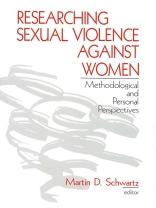As the backlash against feminist research continues unabated, this important volume signals no retreat. Bringing together the foremost international researchers in the area of violence against women, Researching Sexual Violence Against Women offers excellent assessments of the dimensions of date rape-particularly on college campuses. Reasons why this form of violence against women has provoked such intense responses as well as new methodologies are thoroughly explored. Finally, the work examines the impact this research has on those who do it and calls for more work on women′s victimization and the links between it and other forms of discrimination. –Meda Chesney-Lind, Women′s Studies Program, University of Hawaii–Manoa A remarkable introduction to research in the field, Researching Sexual Violence Against Women provides cutting-edge information on the various studies conducted on North American campuses. This compelling book not only provides a strong overview of the entire field but also simultaneously offers an answer to backlash critics who claim that feminists exaggerate their statistics. Several of the best-known researchers describe their own work and that of others to illustrate both large-scale and local studies. The contributors also take a compelling look into the emotions of sexual assault research by discussing their own emotional experiences of working with rape research, including experiences of harassment by subjects or disrespect by colleagues. In addition, several scholars peruse empirical and epistemological questions–and arrive at surprising conclusions-on feminist participatory research into lesbian battering, reflexivity in studying prostitutes, the gendered nature of research interviews, and white women studying battered women of color. Including chapters on very hot topics and celebrating feminist research methodology, Researching Sexual Violence Against Women speaks to a broad audience, including researchers, academics, professionals, and students in the areas of interpersonal violence, social work, sociology, criminology, women′s studies, psychology, family studies, and counseling as well as college administrators and mental health practitioners.
Table of Content
PART ONE: INTRODUCTION: RESEARCH ON SEXUAL ASSAULT ON COLLEGE CAMPUSES
Stepping on Toes – Mary P Koss and Hobart H Cleveland
Social Roots of Date Rape Lead to Intractability and Politicization
A Longitudinal Approach to the Study of Sexual Assault – Jacquelyn W White and John A Humphrey
Theoretical and Methodological Considerations
Measuring Sexual Abuse in Canadian University/College Dating Relationships – Walter S De Keseredy
The Contribution of a National Representative Sample Survey
Acquaintance Rape Is Real Rape – Patricia A Frazier and Lisa M Seales
Self-Blame in Hidden Rape Cases – Victoria L Pitts and Martin D Schwartz
PART TWO: EMOTION IN RESEARCHING VIOLENCE AGAINST WOMEN
`I Second That Emotion′ – Elizabeth A Stanko
Reflections on Feminism, Emotionality and Research on Sexual Violence
Activist Research and Social Narratives – Susan K Hippensteele
Dialectics of Power, Privilege and Institutional Change
Field Research with Phone Sex Workers – Christine Mattley
Managing the Researcher′s Emotions
The Sexual Harassment of Researchers by Research Subjects – Jennifer K Huff
Lessons from the Field
PART THREE: DOING RESEARCH ON VIOLENCE AGAINST WOMEN
Confessions of a Reformed Positivist – Claire M Renzetti
Feminist Participatory Research as Good Social Science
Researching Violence against Street Prostitutes – Jody Miller
Issues of Epistemology, Methodology and Ethics
Measuring Violence against Women – Dawn H Currie and Brian D Mac Lean
The Interview as Gendered Social Encounter
Studying Violence against Women of Color – Kimberly A Huisman
Problems Faced by a White Woman












